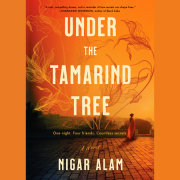Chapter 1Now, 2019Rozeena tightens her fingers around the mobile phone, but it slips down her damp palm. Her other hand flies up to meet it, pushing the phone back to her ear.
"Your voice," she says, a bit breathless. "It's the same." She leans forward in her veranda chair, as if it'll bring her closer to him.
Haaris laughs softly. "Well, I suppose it's the one thing that remains the same, Rozee."
Her throat constricts at the nickname. Only elders or close friends call her Rozee. At eighty-one, she doesn't have many left.
"Is everything all right? Are you all right?" She frowns at the black-and-white tiles under her slippered feet.
"Yes, yes. I'm well," he says. "Just finished breakfast. Around nine o'clock in the morning here."
In Minnesota. She's gotten a little news of him from friends of friends over the years and now detects the slight change in his accent, from the British English Rozeena still speaks, to the harder "r" of the Americans in
morning here.
Her shoulders relax somewhat at hearing he's not calling from his deathbed, and she sits back in her polished rosewood chair. She hadn't recognized the number flashing on her screen when she'd answered the phone. A call with a US country code could've been any one of her old colleagues or distant relatives.
But it'd been Haaris.
She realizes the extent of her surprise as she wipes her hands one by one on her kameez. The soft cotton of her long, blue tunic absorbs the moisture of her palms, but her heart still races, heating her from within. Reaching down, she plucks away the fabric of her shalwar from the backs of her knees. Her face feels damp as well, though Karachi's evening breeze is cool as always, even in July.
She hasn't heard from Haaris in fifty-four years.
Gusts from the Arabian Sea rush toward her, setting the giant palm branches into a powerful spin in the far corner of her garden. She lifts her face to the evening, calming herself to regain control. Silver strands of hair whip in the breeze and she tries to shove them back into her low bun with one hand, but they resist. Let it go, she tells herself, and leaves them to dance on her cheeks.
"I can hear the wind," Haaris says, incredulous. "I can actually hear the Karachi wind."
She smiles. "Yes, it's as loud as ever, but only here closer to the sea. The old neighborhood is congested now, tall buildings and complexes of flats all built up where there were spacious houses." Our houses, she wants to say, but instead says, "I'll be going inside soon. It's past seven o'clock in the evening here." She hopes her statement hurries him into explaining why he's called.
The sun has already dropped low behind the line of tall, pencil-like ashok trees on the right side of her garden. Soon, the call to prayer will burst from loudspeakers at mosques near and far. Five times a day, the azaan thankfully drowns out the continuous buzzing of her neighbors' air conditioners. Beyond her boundary walls all the new houses are giant two-story, sand-colored concrete boxes made wider and noisier by air-conditioning units clinging to every side. Rozeena's single-story home, one of the older ones in this newer neighborhood, is well-balanced. The house that lies behind the veranda is equal in size to the garden that lies in front.
"It's raining here today," Haaris says finally and quietly. "It's not a rainy state, Minnesota. But these days it's raining inside and out."
"Inside and out?"
He exhales audibly. "Three months ago, my grandson died."
A soft gasp escapes her lips. "Oh, Haaris, how...I can't...I'm so sorry," she flounders. The death of a child-but not death in general-still shocks her. She remembers that dreadful saying,
The smallest coffins are the heaviest.After a few moments of silence Haaris speaks, his voice conversational again even though Rozeena heard it catch a second ago. Men of his time are masters at bottling up their emotions.
"Has it rained there yet?" he says. "Or is it waiting for the fifteenth?"
She smiles. He remembers the unpredictable arrival of the monsoon season, unpredictable in its intensity too, sometimes flooding the streets and other times only muddying the dust clinging to leaves. Up north they get the majority of the rains-in the fertile valleys of the Indus River and even further north over the massive Himalayas. But when Karachi does get showers, it somehow rarely happens before July 15. Families can confidently plan all sorts of outdoor events before then, including elaborate weddings.
"You remember," she says.
"I remember everything, Rozee."
She searches his words, his tone, his diction. What is he really saying? Does he want her to apologize, or is he going to?
"But right now, I have a favor to ask," he continues.
"Oh?" Her guard is up instantly.
"I have a granddaughter, his sister. Her name is Zara. She's fifteen years old and in Karachi these days visiting with her parents, my son and his wife. They visit every summer." He pauses. "Zara says she wants to do something by herself in Karachi, some 'good' while she's there. Her parents of course are scared to let her out of their sight, after her brother."
"Yes, of course."
"So, we're trying to find something very safe for Zara to do." He takes a deep breath. "You remember my oldest sister, Apa, who still lives in Karachi? Well, she mentioned you need a temporary maali."
"A maali? How does she know?" Confused, Rozeena wonders why her servant situation is being discussed.
"I think Apa heard through a mutual friend," Haaris says. "You know how news travels." Rozeena and Apa don't socialize directly, but it's a small world, this city of over fifteen million.
And Haaris's information is correct. Rozeena does need someone to tend to her garden now that Kareem, who's worked for her for more than fifteen years, has fractured his tibia. A speeding rickshaw crashed into his bicycle last Wednesday when he was on his way to his fifth house for gardening work. The following morning, the eldest of his six sons arrived at Rozeena's house, ready to fulfill his father's duties. Of course she sent the eleven-year-old away, straight to the school in which she'd enrolled him, and with a stern warning not to miss a single day.
How will they be anything but maalis if they don't go to school? she wanted to say to Kareem that evening in the hospital. But Kareem knew this well and was grateful for Rozeena's help over the years. Rozeena just hoped that Kareem's other employers would also continue to pay his wages and keep his family afloat.
"Since you need a maali," Haaris says, "I was thinking it would be wonderful if Zara could do the work and be your temporary maali."
The phone feels hotter against her cheek. Her breath comes faster. Haaris has gone from staying away and silent for more than fifty years to suddenly injecting himself into her life by depositing his granddaughter at her doorstep.
Why?
It's too close, too dangerous, for herself and for her son.
Haaris explains how Zara would do the maali's work, and her parents would worry less if she worked in a home like her own grandfather's. Rozeena stops herself from saying that their homes, like their lives, were never alike.
"And Apa knows this?" she says instead, doubting his older sister has agreed. Apa would never sully the family reputation by allowing her grandniece to be a maali, even if just for the summer.
"Apa will tell herself a comfortable and acceptable version of Zara's time at your house." He pauses, before almost pleading. "Will you do it, Rozee?"
She's too surprised by both his telephone call and his odd request to answer immediately.
"It would help," he continues.
"I'm certain Apa can find something else for Zara to do."
"Yes, maybe. But I don't know if Zara would agree. I'm not saying she's being difficult. No, no. Of course I don't mean that." He sighs. "But what she's gone through...Well, you can imagine, can't you, Rozee?"
She nods into the phone, and Haaris continues as if he can see her.
"That's why I want Zara to be with you, under your care. There's no one else who can help her like you can."
Rozeena nods again. She has always taken care of people. It's who she is, even before she was a trained doctor, and even now, years after retirement. But the risk is too high.
"Most of the people I knew in Karachi have moved out, or moved on," Haaris says. "Of course you don't have to agree to this, especially after all the . . . the quiet of these past years."
The past is exactly what she fears. It's what can destroy her little family, crush her son.
"I can't do this, Haaris."
"Please, Rozee. Please, just think about it. For Zara. For her sake."
For her sake. For his sake. It's the past all over again. She pushes it away to focus on practical matters.
"How long is she in Karachi?"
"Well, her parents have already taken so much leave from their work this year. Most likely they'll have to come back to Minnesota before Zara's summer vacation is over. But then I'll go to Karachi to travel back with her."
Rozeena's breath catches and simultaneously the azaan erupts in the air. Another call to prayer starts within seconds, from a farther mosque. Then another from the opposite direction. Echoes surround Rozeena like old memories rolling toward her.
Haaris is coming back.
She swallows hard, but her mouth remains dry.
He doesn't speak until the loudest azaan has ended. "That was beautiful," he says then, and she imagines his eyes closed, his dark lashes long and resting on his cheeks as he listens to the azaan from the other side of the world.
***After an entirely sleepless night, Rozeena gives her answer the next morning.
Starting today, Zara will be Rozeena's maali.
Haaris is grateful, and Rozeena is scared. There will have to be strict rules and schedules, so her son and Zara never meet, so the past has no chance of entering her dear son's life.
In reply to Haaris's thank-you, Rozeena types out:
It's for the child.She repeats the statement to herself over and over again. Perhaps by bearing the risk to help young Zara, Rozeena will finally be able to atone for what happened fifty-four years ago.
Later that day, after proper introductions are shared, Zara’s parents wave through the rear window of a white BMW as it slowly pulls away from Rozeena’s house. Initially Zara’s parents had been apprehensive, but by the end of the visit, they’d approved of Rozeena, her lone existence in a house with a staff of servants, her past life as a pediatrician, her location so close to theirs, and of course her friendship with Haaris. Zara had nodded at everything her parents said, including how interested she was in gardening, a new but true passion. They’re staying with family only two streets down, but Rozeena notices before they leave that Zara’s parents’ anxious faces and shaky palms seem as if they’re leaving something precious far, far behind.
Rozeena isn't surprised, of course. They've suffered the worst kind of loss already. Their son was in a friend's car when it happened. All the other boys survived the crash.
She glances up at Zara now, tall like her father, and like Haaris. She wears black leggings under a light pink kameez like girls do in Karachi these days, and her straight dark hair falls well below her shoulders. She looks quite grown up with it parted down the center and framing her oval face. But she waves back at her parents like a child, smiling and swinging her raised arm side to side so it's visible even from a distance. As soon as the car turns the corner though, her smile fades as her hand falls.
"Should we go back inside now?" Rozeena says.
Zara's eyes are big and brown, also strikingly like Haaris. "You can't even tell it's a desert here." She looks up and down the road. "My friends always ask me if Karachi is just, like, sand dunes and camels and stuff."
They stand in a bubble of abundant sweet jasmine from the thick rows of bushes growing outside all the homes' boundary walls. Tall coconut palms, ashok trees, and giant neem trees stand inside the walls, some looming over sparkling swimming pools. The street is otherwise empty as it is in the evenings, with only a hint of diesel from the main road where buses honk and rickshaws sputter in the distance.
"Well, I'm sure you've ridden camels on the beach at Sea View." Rozeena turns to lead Zara back inside. "And it's certainly a desert here. If I don't take care, a lot of care, all of this will shrivel up and die," she says, stopping inside the gate to gesture at her garden. Her maali does all the hard work, of course, but Rozeena manages it.
Zara joins her at the bottom of the driveway, and Rozeena's driver, Pervez, pulls the black metal gate shut behind them. Other than the long driveway leading up to the car porch on the right side of the property, the rest of the land is neatly cut in half, with a large rectangular garden in front of the house. A wide wooden pergola juts out from its center above the tiled veranda.
Rozeena cuts across the grass on her way to the veranda and points out plants and bushes that are in immediate need.
"The organic fertilizer is coming on Wednesday, but before then the water tanker best arrive, otherwise-"
"They'll all shrivel up and die," Zara interjects, and quickly bites her lip.
Rozeena says nothing until she's settled in a veranda chair. The change underfoot from grass to tile always requires extra attention. She knows full well the dangers of broken hips at her age. As she smooths her peach-colored cotton kameez over her lap, she pulls the matching chiffon dopatta down to form a V on her chest. The breeze cools her throat as she considers how Haaris's granddaughter is not really the silent, agreeable girl she was in front of her parents.
As Zara leans back on the other wooden chair now, Rozeena says, "What did your grandfather tell you about me?"
Zara shrugs. "Nothing," and then adds, "What did he tell you about me?"
Straight to the point, like Rozeena herself. "He told me your brother died. I'm so sorry."
"Well, that's me." Zara raises her hand like someone called her name in school.
Rozeena imitates the gesture, not unkindly. "Me too."
Zara's mouth is open, as if unsure of what to say.
Rozeena shifts in her chair. Even after all this time, it’s difficult to talk about. "I lost my brother too, long ago."
"Oh, I'm sorry." Zara bows her head.
"Thank you. No one's ever said that to me before," and to answer Zara's puzzled look, adds, "Those were different times."
She doesn't say that in those days, loss wasn't spoken of perhaps because there was too much all around, and for too many families. Instead of remembering the pain and releasing the anguish, they used that energy to protect whatever was left behind.
Chapter 2 Then, 1964 10 Days Before Rozeena woke thinking of Haaris. In one more day he'd be back from Liverpool, and then she'd know, or at least begin to discover, what he'd meant by his last goodbye.
The four of them had gathered in Zohair's garden that night —Aalya from upstairs, Rozeena from next door, and Haaris from across the street —neighborhood friends who might never have met. Three of them had crossed the border seventeen years ago with their families, refugees of Partition who by chance landed here, on short Prince Road. Only Haaris's family had firm roots in Karachi. Seven generations of amassing wealth had established the Shahs among the powerful elite, their branches spreading past their import/export business and into local government, as well.
But as always, that night in Zohair's garden Haaris was simply the friend they'd grown up with. As he told them he'd be back in only six months this time, his eyes lingered on Rozeena’s. She'd held his gaze, and her breath, until he turned away, very slowly.
Now, at the end of the day, Rozeena set the thought aside for the hundredth time. There were more important things. She pulled off her stethoscope and looped it around her neck.
"Your lungs are clear," she said to Gul, Aalya's maid from next door. "There's no wheeze at all. Are you in any pain?"
They sat facing each other on the only two chairs in Rozeena's free clinic, the tiny storeroom tucked in the corner of the boundary wall at the back of her house. Gul looked as she always did in her clean shalwar kameez, with her hair in a neat, tight braid down her back.
Aalya's mother did most of the housework herself and only called upon Gul once in a while for cleaning or washing. It was a convenient arrangement for both since young Gul had no other work. She'd only recently married and arrived from the village to join her husband, Abdul, who was Zohair's cook in the downstairs portion of the house. Abdul and Gul lived in the servant's quarter behind the house.
Copyright © 2023 by Nigar Alam. All rights reserved. No part of this excerpt may be reproduced or reprinted without permission in writing from the publisher.






